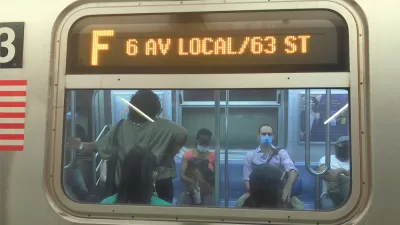A few last minute changes were included in the version of the COVID-19 Emergency Relief Act of 2020, approved by Congress last night.

A Twitter thread by APA Advocates calls attention to the inclusions in the COVID-19 Emergency Relief Act of 2020, approved by Congress on Monday of this week.
The Twitter thread includes a breakdown of spending included in the $900 billion stimulus package, including $14 billion for public transit agencies (down from the $15 billion that was considered in negotiations), $10 billion for state departments of transportation, and $1 billion for Amtrak.
In terms of the real estate market and the looming eviction and mortgage crisis facing many Americans, the bill includes $25 billion in emergency assistance to renters and extends the federal eviction moratorium until January 31.
The Twitter thread lists a few other of the funding allotments included in the bill, while also noting what's missing, namely, direct relief for local and state governments.
One key inclusion of note that might seem like a wildcard: the bill included the Water Resources Development Act, which "expands #resiliency, green infrastructure & #EnvironmentalJustice provisions; a modified energy bill that expands clean energy; and a climate measure," according to APA Advocates.
More discussion of the relief bill can be found at the #coronabus hashtag on Twitter, and Planetizen will continue to provide updates of the most informative analysis and commentary on the bill.
FULL STORY: The bipartisan #COVID19 relief deal Congress passed last night...

Maui's Vacation Rental Debate Turns Ugly
Verbal attacks, misinformation campaigns and fistfights plague a high-stakes debate to convert thousands of vacation rentals into long-term housing.

Planetizen Federal Action Tracker
A weekly monitor of how Trump’s orders and actions are impacting planners and planning in America.

In Urban Planning, AI Prompting Could be the New Design Thinking
Creativity has long been key to great urban design. What if we see AI as our new creative partner?

King County Supportive Housing Program Offers Hope for Unhoused Residents
The county is taking a ‘Housing First’ approach that prioritizes getting people into housing, then offering wraparound supportive services.

Researchers Use AI to Get Clearer Picture of US Housing
Analysts are using artificial intelligence to supercharge their research by allowing them to comb through data faster. Though these AI tools can be error prone, they save time and housing researchers are optimistic about the future.

Making Shared Micromobility More Inclusive
Cities and shared mobility system operators can do more to include people with disabilities in planning and operations, per a new report.
Urban Design for Planners 1: Software Tools
This six-course series explores essential urban design concepts using open source software and equips planners with the tools they need to participate fully in the urban design process.
Planning for Universal Design
Learn the tools for implementing Universal Design in planning regulations.
planning NEXT
Appalachian Highlands Housing Partners
Mpact (founded as Rail~Volution)
City of Camden Redevelopment Agency
City of Astoria
City of Portland
City of Laramie





























